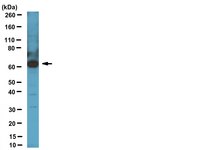Efficient parvovirus replication requires CRL4Cdt2-targeted depletion of p21 to prevent its inhibitory interaction with PCNA.
Adeyemi, RO; Fuller, MS; Pintel, DJ
PLoS pathogens
10
e1004055
2014
Show Abstract
Infection by the autonomous parvovirus minute virus of mice (MVM) induces a vigorous DNA damage response in host cells which it utilizes for its efficient replication. Although p53 remains activated, p21 protein levels remain low throughout the course of infection. We show here that efficient MVM replication required the targeting for degradation of p21 during this time by the CRL4Cdt2 E3-ubiquitin ligase which became re-localized to MVM replication centers. PCNA provides a molecular platform for substrate recognition by the CRL4Cdt2 E3-ubiquitin ligase and p21 targeting during MVM infection required its interaction both with Cdt2 and PCNA. PCNA is also an important co-factor for MVM replication which can be antagonized by p21 in vitro. Expression of a stable p21 mutant that retained interaction with PCNA inhibited MVM replication, while a stable p21 mutant which lacked this interaction did not. Thus, while interaction with PCNA was important for targeting p21 to the CRL4Cdt2 ligase re-localized to MVM replication centers, efficient viral replication required subsequent depletion of p21 to abrogate its inhibition of PCNA. | 24699724
 |
A gatekeeper residue for NEDD8-activating enzyme inhibition by MLN4924.
Toth, JI; Yang, L; Dahl, R; Petroski, MD
Cell reports
1
309-16
2012
Show Abstract
Inhibition of NEDD8-activating enzyme (NAE) has emerged as a highly promising approach to treat cancer through the adenosine sulfamate analog MLN4924. Here, we show that selective pressure results in HCT116 colorectal carcinoma cells with decreased MLN4924 sensitivity and identify a single-nucleotide transition that changes alanine 171 to threonine (A171T) of the NAE subunit UBA3. This reduces the enzyme's affinity for MLN4924 and ATP while increasing NEDD8 activation at physiological ATP concentrations. Expression of UBA3 A171T is sufficient to decrease MLN4924 sensitivity of naive HCT116 cells, indicating that it is a dominant suppressor of MLN4924-mediated cell death. Our data suggest that the on-target potency of MLN4924 selects for a point mutation in NAE that overcomes the molecule's inhibitory effects, allowing cancer cell survival. | 22832224
 |
Minichromosome maintenance helicase paralog MCM9 is dispensible for DNA replication but functions in germ-line stem cells and tumor suppression.
Hartford, SA; Luo, Y; Southard, TL; Min, IM; Lis, JT; Schimenti, JC
Proceedings of the National Academy of Sciences of the United States of America
108
17702-7
2011
Show Abstract
Effective DNA replication is critical to the health and reproductive success of organisms. The six MCM2-7 proteins, which form the replicative helicase, are essential for high-fidelity replication of the genome. Many eukaryotes have a divergent paralog, MCM9, that was reported to be essential for loading MCM2-7 onto replication origins in the Xenopus oocyte extract system. To address the in vivo role of mammalian MCM9, we created and analyzed the phenotypes of mice with various mutations in Mcm9 and an intronic DNA replication-related gene Asf1a. Ablation of Mcm9 was compatible with cell proliferation and mouse viability, showing that it is nonessential for MCM2-7 loading or DNA replication. Mcm9 mutants underwent p53-independent embryonic germ-cell depletion in both sexes, with males also exhibiting defective spermatogonial stem-cell renewal. MCM9-deficient cells had elevated genomic instability and defective cell cycle reentry following replication stress, and mutant animals were prone to sex-specific cancers, most notably hepatocellular carcinoma in males. The phenotypes of mutant mice and cells suggest that MCM9 evolved a specialized but nonessential role in DNA replication or replication-linked quality-control mechanisms that are especially important for germ-line stem cells, and also for tumor suppression and genome maintenance in the soma. | 21987787
 |











